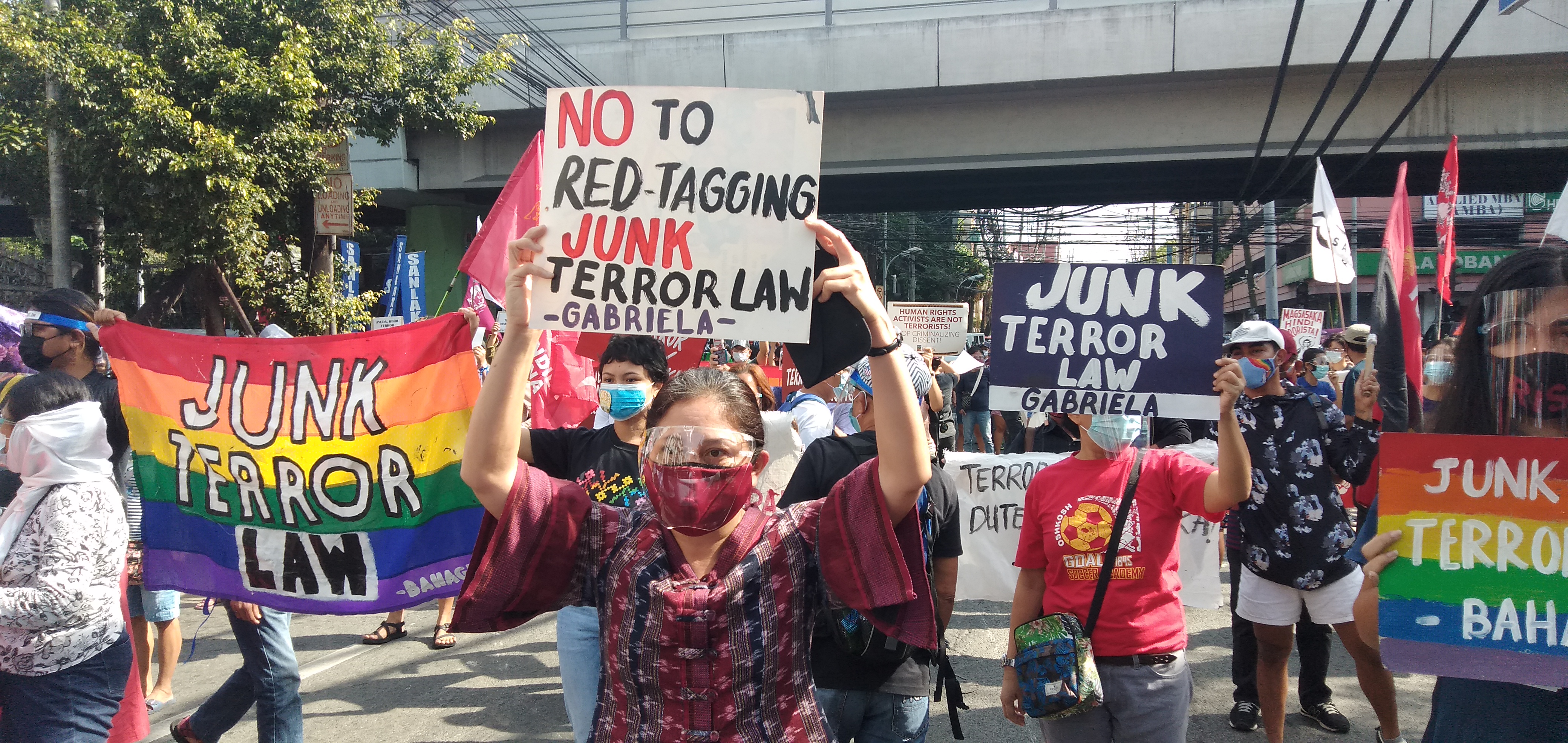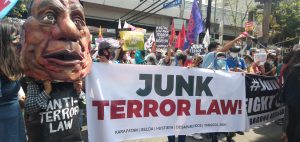On February 2, the Supreme Court in Manila held oral arguments on the whopping 37 petitions filed by various civil society groups against the controversial Anti-Terror Law. The end of the session was inconclusive and is set to continue on February 9.
Since the inception of the law and its passage in July 2020, rights groups have been up in arms about what they see as draconian provisions and intentions. Attorney, law professor, and former dean Tony La Viña explained to The Diplomat the law’s most contentious provisions: “One is the definition of terrorism, which is made very general, drawing no lines between dissent and terrorism. Then there is a provision that allows for longer detention without an arrest warrant or judicial intervention. The combination of these is very dangerous.”
The act sparked controversy immediately after being passed. In addition to the rights concerns – which saw petitions filed to the Supreme Court just days after the law was enacted – many Filipinos were upset the Duterte administration had pushed anti-terrorism legislation as a urgent priority in the middle of COVID-19 and the ensuing economic crisis.
The law itself cites national security as a primary driving force. Lt. General Antonio Parlade, spokesperson for the National Task Force to End the Local Communist Armed Conflict (NTF-ELCAC) earlier tried to assuage any fears, saying that, “We don’t over-generalize but we will call spade a spade. If you don’t aid terrorists, then you are safe, no matter how loud your voices are in airing your grievances against the government.”
The body that will determine who or what group is considered a terrorist is the Anti-Terrorism Council, made up of cabinet secretaries. This means that the president himself and the council can be privy to order arrests arbitrarily or based on mere suspicion.
Attorney Neri Colmenares, the lead counsel for the petitioners against the law, argued in his opening statement that “in the real world out there, who are the targets of this deprivation of rights without judicial trial? The law targets an ascertainable group of activists and perceived dissenters who have been the victims of red-tagging and terrorist-tagging by the mere claim that they are ‘suspected persons.’”
Justice Marvic Leonen, however, questioned if the judiciary should already rule on the legislation given that there has yet to be any significant or harmful effects that would warrant a repeal.
Responding to that, Colmenares clarified to The Diplomat that there is a precedent for facial challenges in the Supreme Court. This means that a piece of legislation can be contested based on what is written. “We hope that the case against the Anti-Terror Law will be resolved on its merits rather than be dismissed on procedural grounds.”
Colmenares mentioned the practice of red-tagging, or the act of labeling critics, activists, and any detractors to the establishment as communists or terrorists – two terms that are largely interchangeable in the eyes of the state. A 50-year-old insurgency is being waged in the Philippines by the Communist Party and its guerrillas in the New People’s Army (NPA). While armed insurrection is illegal, even civilian activists have been “tagged” as conspirators with the rebels because of their outspoken views. For lawyers like Colmenares, red-tagging and/or terror-tagging are preludes and justifications for the state crackdown.

People protest outside the gates of the Supreme Court as oral arguments start in a case against the Anti-Terror Law. Photo by Michael Beltran.
Terror Reigns
Colmenares said that intent can be already deemed as terrorism by the authorities, hence, “This matter should be resolved soon by the courts because abuses are already happening.”
The Kilusang Magbubukid ng Pilipinas (Peasant Movement of the Philippines), one of the petitioners to the Supreme Court, argues that there is already sufficient basis to deem the Anti-Terror Law an “affront to the people.” Danilo Ramos, the group’s chairperson, cited the case of Aeta farmers Japer Gurung and Junior Ramos, who were jailed and charged with terrorism in September of last year. The pair were resisting the militarization in their community and subsequently accused of firing shots at the military. According to the arrested farmers, they were brutally tortured for six days by the police before being forced to admit that they were members of the NPA.
Another victim spoke with The Diplomat. Attorney Vj Topacio, who was part of the seventh petition against the Anti-Terror Law, tragically lost his parents who were murdered during a police raid last December. According to their son, Eugenia Magpantay and Agaton Topacio were retired from the communist movement and peacefully living out their senior years. The authorities allege that the elderly couple fought back prompting shots from the raiding party. Activists decried the act as an execution carried out without trial. The case was also mentioned at Anti-Terror Law protests as an example of the extreme powers that law enforcement are granted.
Speaking of his parents, Topacio said that “their whole lives they have been in danger. But they chose to confront an oppressive system, they should be celebrated not vilified. And we will not stop calling for justice.”
Himself a human rights lawyer, Topacio added that “in this profession, we face harassment and surveillance for breakfast. But this Anti-Terror Law is sharpening the fangs of law enforcement and making all that we face legal. It’s scary to think if the Supreme Court will certify this law as constitutional when it so clearly isn’t.”
He also chided the NTF-ELCAC’s massive 19 billion peso ($395 million) budget for this year, saying that having all those resources to pursue national security means they shouldn’t even need to push for the Anti-Terror Law in the first place.
Next Round
Looking ahead to the next proceedings, La Viña said that he was “hopeful” a positive outcome will eventually come to light. According to him, “freedom and democracy are at stake. The Anti-Terror Law is a blunt weapon against all dissent. It’s an instrument that can be used against people trying to make the country better.”
For his part, Colmenares remains optimistic of their chances and believes that they have a strong case. “Probably the court will continue on the procedural aspects, but we hope to get to the substantive parts to question whether the law violates free speech and other civil and political rights.”
Michael Beltran is a freelance journalist from the Philippines.

































